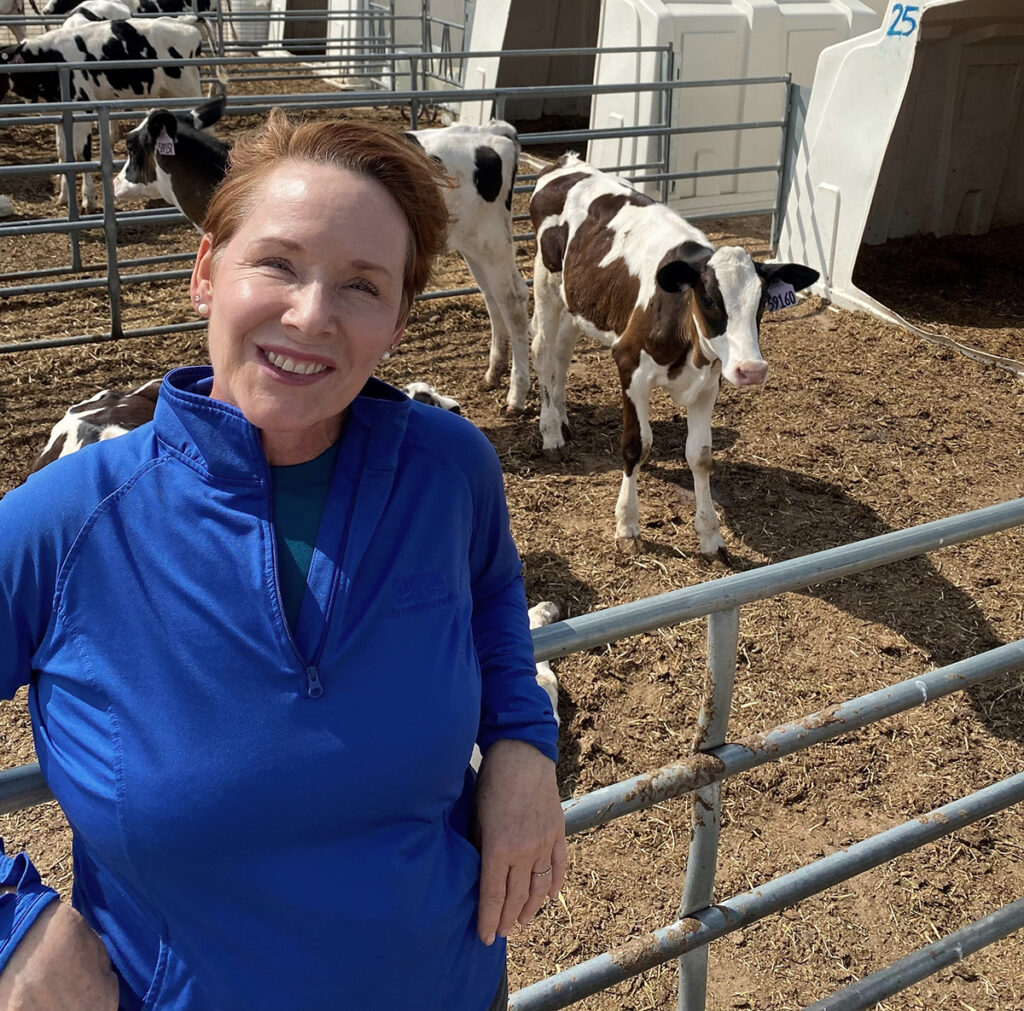
DIGITAL DAIRY
Industry leader uses technology to support cow comfort
By Coleman Cornelius | Jan. 3, 2022
IT TAKES MERE HOURS for milk to get from Mary Kraft’s 6,000 Holstein dairy cows to the top of your brand-name pizza, in the form of mozzarella cheese.
“You can’t get fresher than that!” Kraft recently proclaimed.
Sure, much of the milk from Quail Ridge Dairy travels just a few miles to the Leprino Foods plant in Fort Morgan, where the world’s largest producer of mozzarella converts it into pizza topping. Even so, the quick turnaround reflects Kraft’s favorite managerial concept: flow. In her case, that means integration of systems that efficiently deliver high-quality protein from cows found lazily chewing their cud in an airy barn on the Eastern Plains.
Kraft is co-owner with her husband, Chris, of Quail Ridge Dairy and its sister operation, Badger Creek Farm. She fills the roles of chief financial officer, human resource manager, and public relations agent for her family operation. Kraft also is a dynamo in the dairy business – a well-known advocate for Colorado’s No. 2 agricultural commodity, behind beef. Several years ago, she was the first woman to serve as president of the Colorado Livestock Association, a leading industry group, and she’s often part of state and national discussions about the future of food and agriculture.
“I get so excited about agriculture. I love what I do,” Kraft said, as she showed off equipment that, in just five minutes, cools fresh milk from the 101-degree body temperature of a cow to a safe storage temperature of 38 degrees. “I drive into this dairy every day and I go, ‘Oh, my God, it’s beautiful.’”
The Kraft operation is among 120 Colorado dairy farms, which are home to a total of 186,000 milk cows, according to the U.S. Department of Agriculture. The Kraft farm – with 6,000 milk cows and 85 regular employees – is on the large end of dairy farms in the state. And it outpaces the standard in milk production: Each cow here produces an average of nearly 11 gallons of milk per day, compared to a state average of just over 8 gallons.
Stats like that reflect a farm that runs on science and technology. In fact, don’t let pastoral scenes in dairy marketing fool you: The industry long has been an early adopter of scientific advancements in animal agriculture. For a start, cows, like all mammals, produce milk only after giving birth; so it’s no surprise that dairies rely on leading-edge reproductive technologies, beginning with whole-herd artificial insemination. And dairy cows are bred for high-powered genetics – heritable traits that indicate health and lactation prowess.
“We’re asking these girls to be elite athletes,” Kraft explained, as she watched her cows habitually amble into and out of the milking parlor. Each cow is milked three times daily.
With those high expectations, Kraft uses Bluetooth technology to track the health and performance of each cow in her herd. Every cow wears a collar with a transponder that relays real-time data via an app on Kraft’s cellphone. So, as Kraft walks down a barn alley, she can consult her phone to check how much milk a cow has produced on a given day, where that cow is in her reproductive cycle, and whether she’s due for a hoof trim or vaccination. If a cow meanders into the milking parlor off her customary schedule, Kraft can use wireless-enabled, mechanized gates to calmly move the cow into a nearby stall for a health check.
The Kraft farm is a leading example of what industry insiders call the “digital dairy” – where data are tracked with wireless technology, and many operations, from feeding to manure management, are run and monitored with computerized equipment. That leaves cow care and decision-making to people who are better informed. “Our operation wouldn’t exist without technology,” Kraft said.
Kraft grew up on a family dairy farm near Brighton, north of Denver. At age 7, she earned 25 cents a day for feeding the calves. Yet, Kraft had a different career in mind when she attended Colorado State University to earn a journalism degree in 1986: She saw a need to communicate about agriculture with audiences outside the industry. During her time on campus, Kraft joined the CSU polo team and met a teammate named Chris Kraft, her future husband. He was studying animal science – and he happened to love cows. Mary Kraft gravitated back to an occupation she knew well.
In 1988, the couple started their dairy in Fort Morgan with 240 cows, and Mary Kraft began running the business side of the operation, soon finding that her communication skills were an integral part of the job. She also discovered her love for data.
Today, Kraft’s data analysis is central to a business model built on animal welfare.
“This is the goose that lays the golden egg. It’s paramount that these girls get what they need,” Kraft said, while touring her dairy. “Welfare is job No. 1 for a dairy operation. If you don’t take care of your cows, they can’t take care of you.”
Photo at top: Mary Kraft is a fourth-generation dairy farmer and is co-owner with her husband, Chris, of Quail Ridge Dairy and Badger Creek Farm outside Fort Morgan, on Colorado’s Eastern Plains. She is a livestock industry leader who emphasizes the importance of technology and communication in food-animal production. Photo: Jordan Lambert
SHARE
